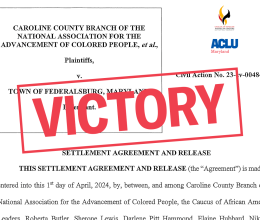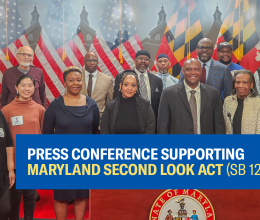
Learn more about Dashiell v. Maryland State Police
Contact: Meredith Curtis, ACLU of Maryland, 410-889-8555; media@aclu-md.org
PRINCESS ANNE – Championing transparency in investigations of police misconduct, the American Civil Liberties Union (ACLU) of Maryland is asking the Maryland Court of Appeals to permit disclosure of investigative records generated by citizen complaints of police misconduct. The state’s high court is considering the case of ACLU client Teleta Dashiell, a Somerset County woman who filed a complaint against a Maryland State Police (MSP) trooper who was recorded denigrating her with a racial slur. The MSP sustained the complaint, but refused to give Ms. Dashiell any information about its investigation or actions taken as a result. In a legal filing with the high court on Friday, the ACLU argues that neither the Maryland Public Information Act (MPIA) nor the Maryland Law Enforcement Officers’ Bill of Rights (LEOBR) prohibits disclosure of complaint investigation records, the release of which is vital to restoring trust with those who file complaints of misconduct and their communities.
“This case speaks to the heart of the need for public transparency in cases of police misconduct, echoing a cry resonating throughout Maryland and across America from communities whose trust in law enforcement has been shattered by recent events,” said Deborah Jeon, ACLU of Maryland Legal Director.
More than five years ago, Ms. Dashiell requested records from the MSP about how it handled her complaint. But MSP has taken the extreme position that all records pertaining to her complaint must be kept secret, including her own statement to police, claiming that such records are "personnel" records or else shielded from public view by the LEOBR. MSP has refused to even name the records it is withholding from Dashiell, arguing that the law does not recognize the right of a complainant like Ms. Dashiell to information about her own police misconduct complaint.
"At first, I thought I misunderstood the officer, so I replayed the message four to five times to make sure," said Ms. Teleta Dashiell. "I was shocked, frustrated, and upset. I have a right to know what the police department did to investigate and address this incident. You hear that racism is over, but it is real, and the police need to honor the oaths they take to protect everyone in our communities."
Briefing in the case will be completed over the next two months, and oral arguments will be heard by the Court of Appeals on May 11.
“People who have had the courage to come forward with evidence of police misconduct have the right to know whether the government has done a meaningful investigation of the misconduct and what action was taken to address it,” said ACLU Staff Attorney Sonia Kumar. “Investigations of police misconduct should not be shrouded in secrecy. Such secrecy is the enemy of trust between police and the communities they are sworn to serve.”
Background:
On November 5, 2009, Sergeant John Maiello, an MSP trooper, contacted Teleta Dashiell because he believed she might be a witness in a case he was investigating. After leaving her his contact information, Maiello - mistakenly believing he had hung up the phone - continued in a conversation with someone else, referencing Ms. Dashiell using a racial slur. Dashiell filed a complaint with the MSP, cooperated with the investigation, and several months later received a letter stating that her claim was sustained and appropriate action had been taken. However, the state police did not provide any further information about its investigation or the action taken.
In March 2010, seeking additional information about how Dashiell's complaint was handled, the ACLU filed a Maryland Public Information Act (MPIA) request on behalf of Dashiell to obtain MSP records arising from her complaint. MSP refused to release a single document, including Dashiell's own statement, contending that all the documents are personnel records that are strictly confidential, and that the Law Enforcement Officers' Bill of Rights (LEOBR) bars their disclosure. When Dashiell went to court seeking further review, the Circuit Court of Baltimore County, without examining the documents or even requiring MSP to produce an index of what documents exist, granted summary judgment to MSP, permitting the MSP to shield all records of complaint investigations from public scrutiny..
The ACLU asked the Maryland Court of Special Appeal court to overturn that ruling, arguing that MSP's blanket refusal to disclose any information about its investigation of Dashiell's complaint, or about any corrective actions taken in response, was unlawful, and if allowed to stand would undermine trust with communities police are sworn to serve:
In October of 2014, the Court of Special Appeals ruled for Dashiell, holding that the state police could not make blanket claims that every document pertaining to her complaint of police misconduct must be kept secret. The intermediate appellate court sent the case back to the trial court for examination of what documents exist in the file, and the specific grounds on which each document is being withheld by the MSP.
Apparently unwilling to provide even the trial judge with more information about its investigation of Dashiell's complaint, MSP appealed the ruling further, to Maryland's top court. Recognizing the timeliness and importance of the issues raised by Dashiell's case, the ACLU joined the request for a definitive ruling by Maryland's high court, but asked that Court to go further, and to reject the MSP's claim that Dashiell has no legally significant interest in documents pertaining to her complaint. In December 2014, the Court of Appeals announced it would consider this important case.
At issue is the age-old question, "Quis custodiet ipsos custodes?" - who shall guard the guardians? The specific issue before the courts is the public's right to information about how our police departments "police" themselves when dealing with citizen complaints of misconduct. This case has special resonance in light of current events in Maryland and across the country that have brought issues of police accountability to the forefront of public consciousness. It also falls against the backdrop of twenty years of litigation addressing longstanding and persistent violations of civil rights by the MSP, including racial profiling of African-American motorists and spying on political activists, as well as the agency's efforts to shield itself from public scrutiny by seeking criminal prosecution of individuals recording MSP officers performing their on-the-job duties. The case also follows years of MPIA litigation seeking information from the MSP to determine whether the agency is taking adequate steps to make good on its commitments to remedy its failures, after it was revealed that out of 100 citizen complaints alleging racial profiling over the five-year period from 2003-2008, not a single complaint was sustained.
Teleta Dashiell is represented by pro bono attorneys Jeff Johnson, Woody Peterson, and Mary Gardner, of Dickstein Shapiro LLP, Seth A. Rosenthal, of Venable LLP, and ACLU of Maryland Legal Director Deborah Jeon, and Staff Attorney Sonia Kumar.
###







